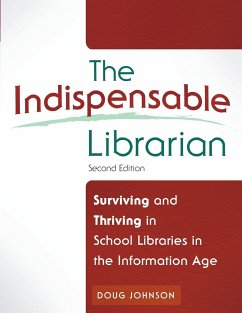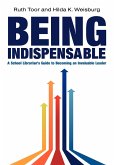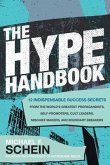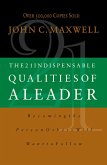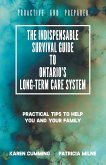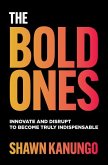Douglas A. Johnson
The Indispensable Librarian
Surviving and Thriving in School Libraries in the Information Age
Douglas A. Johnson
The Indispensable Librarian
Surviving and Thriving in School Libraries in the Information Age
- Broschiertes Buch
- Merkliste
- Auf die Merkliste
- Bewerten Bewerten
- Teilen
- Produkt teilen
- Produkterinnerung
- Produkterinnerung
This readable and practical book examines the changes in school libraries brought by the digital revolution-and describes how new and experienced librarians can take advantage of them.
Andere Kunden interessierten sich auch für
![Being Indispensable Being Indispensable]() Ruth ToorBeing Indispensable49,99 €
Ruth ToorBeing Indispensable49,99 €![The Solo Librarian The Solo Librarian]() Lucy Roper (BSc (Hons) , PG CHEM, MCLIP, AFHEA. ORCID: 0009-0008-317The Solo Librarian94,99 €
Lucy Roper (BSc (Hons) , PG CHEM, MCLIP, AFHEA. ORCID: 0009-0008-317The Solo Librarian94,99 €![The Hype Handbook: 12 Indispensable Success Secrets From the World's Greatest Propagandists, Self-Promoters, Cult Leaders, Mischief Makers, and Boundary Breakers The Hype Handbook: 12 Indispensable Success Secrets From the World's Greatest Propagandists, Self-Promoters, Cult Leaders, Mischief Makers, and Boundary Breakers]() Michael ScheinThe Hype Handbook: 12 Indispensable Success Secrets From the World's Greatest Propagandists, Self-Promoters, Cult Leaders, Mischief Makers, and Boundary Breakers28,99 €
Michael ScheinThe Hype Handbook: 12 Indispensable Success Secrets From the World's Greatest Propagandists, Self-Promoters, Cult Leaders, Mischief Makers, and Boundary Breakers28,99 €![The 21 Indispensable Qualities of a Leader (International Edition) The 21 Indispensable Qualities of a Leader (International Edition)]() John C. MaxwellThe 21 Indispensable Qualities of a Leader (International Edition)12,99 €
John C. MaxwellThe 21 Indispensable Qualities of a Leader (International Edition)12,99 €![The Indispensable Leader's Handbook The Indispensable Leader's Handbook]() James M. KerrThe Indispensable Leader's Handbook152,99 €
James M. KerrThe Indispensable Leader's Handbook152,99 €![The Indispensable Survival Guide to Ontario's Long-Term Care System The Indispensable Survival Guide to Ontario's Long-Term Care System]() Karen CummingThe Indispensable Survival Guide to Ontario's Long-Term Care System19,99 €
Karen CummingThe Indispensable Survival Guide to Ontario's Long-Term Care System19,99 €![The Bold Ones: Innovate and Disrupt to Become Truly Indispensable The Bold Ones: Innovate and Disrupt to Become Truly Indispensable]() Shawn KanungoThe Bold Ones: Innovate and Disrupt to Become Truly Indispensable22,99 €
Shawn KanungoThe Bold Ones: Innovate and Disrupt to Become Truly Indispensable22,99 €-
-
-
This readable and practical book examines the changes in school libraries brought by the digital revolution-and describes how new and experienced librarians can take advantage of them.
Hinweis: Dieser Artikel kann nur an eine deutsche Lieferadresse ausgeliefert werden.
Hinweis: Dieser Artikel kann nur an eine deutsche Lieferadresse ausgeliefert werden.
Produktdetails
- Produktdetails
- Verlag: ABC-CLIO
- 2 Revised edition
- Seitenzahl: 232
- Erscheinungstermin: 9. Mai 2013
- Englisch
- Abmessung: 280mm x 216mm x 13mm
- Gewicht: 584g
- ISBN-13: 9781610692397
- ISBN-10: 161069239X
- Artikelnr.: 36874687
- Herstellerkennzeichnung
- Libri GmbH
- Europaallee 1
- 36244 Bad Hersfeld
- gpsr@libri.de
- Verlag: ABC-CLIO
- 2 Revised edition
- Seitenzahl: 232
- Erscheinungstermin: 9. Mai 2013
- Englisch
- Abmessung: 280mm x 216mm x 13mm
- Gewicht: 584g
- ISBN-13: 9781610692397
- ISBN-10: 161069239X
- Artikelnr.: 36874687
- Herstellerkennzeichnung
- Libri GmbH
- Europaallee 1
- 36244 Bad Hersfeld
- gpsr@libri.de
Doug Johnson has over a decade of extensive and practical experience spanning 300+ projects in the domestic low energy home building sector. From installing renewable systems, project management and running design teams, he now specialises in helping architects and their clients to better design and build successful low energy homes. Learn more at www.mesh-energy.com
List of Figures Foreword: You Have to Be Mad Joyce Kasman Valenza
Acknowledgments Introduction to the Second Edition Chapter One: The Roles
and Missions of the Librarian The Virtual Librarian What are the challenges
facing our profession? Seven ways for librarians to remain relevant in a
ubiquitous information environment full of NetGen learners Do school
librarians have "enduring values"? Sample professional mission statement
and the elevator speech The Mankato transition: A case study For
reflection: Why are you in the profession? Chapter Two: Program Assessment
Creating long-term change How will you show your program is impacting
student achievement? Why assess your program? The formal library assessment
Ongoing assessments Context and focus A 12-point library program checklist
for principals For reflection: Linking libraries and reading achievement
Chapter Three: Planning Critical elements of a library/technology plan The
planning process Using goal setting to help in professional evaluations For
reflection: Twenty-plus years of working with advisory groups-what I've
learned Chapter Four: Communications and Advocacy What are the components
of an effective communications program? Speaking where people are listening
Can a good library program be a marketing tool for your school? What are
the basic rules of effective advocacy? For reflection: What is
transparency, and why is it critical to the librarian's success? Chapter
Five: Managing Others and Collaboration Working with the library support
staff Working with the technology department Working with the teaching
staff: The fundamentals of successful collaboration For reflection: What is
the secret to successful supervision? Chapter Six: Managing Digital
Resources You know you are a 21st-century librarian when . . . How has the
library's role changed as information and books go digital? What is cloud
computing, and how can librarians take advantage of it? For reflection:
E-books and libraries Chapter Seven: Curriculum Putting technology skills
in their place Integrating technology skills into an information literacy
curriculum Building an information/technology literacy curriculum Elements
of projects that motivate What new skills are needed to survive the
information jungle? How can librarians support the development of "right
brain" skills? For reflection: What does a library for a postliterate
society look like? Chapter Eight: Budget Budgeting as a library ethic Ten
strategies of effective library budgeters Good purchasing strategies For
reflection: Weed Chapter Nine: Facilities Why should I go to the library
when the library will come to me? The fundamentals of good school library
design and why they are still important Ten common design pitfalls and how
to avoid them For reflection: Are there schools that don't need a library?
Chapter Ten: Digital Intellectual Freedom Freedom to learn Maintaining
intellectual freedom in a filtered world Best practices for meeting CIPA
requirements Seven myths about Internet filters For reflection: Getting
websites unblocked Chapter Eleven: Ethics and Technology How has technology
impacted the ethical practice of librarians? Knowing right from wrong in
the digital age For reflection: Guidelines for educators using social and
educational networking sites Chapter Twelve: Copyright and Creative Commons
Make a copyright u-turn and other audacious statements about copyright
Creative Commons and why it should be more commonly understood For
reflection: Why students (and adults) satisfice Chapter Thirteen: The
Librarian's Role in Effective Staff Development The why, what, and who of
staff development in technology and the librarian's role How can we provide
effective staff development opportunities for our teachers? For reflection:
Top 10 ways to increase your technology skills and knowledge (and the
secret to being perceived as a technology guru) Chapter Fourteen: Surviving
Professional Transitions Personal learning networks-Why you can't afford to
wait for the next conference Finding the time When your job is on the line
. . . For reflection: Prevention Chapter Fifteen: Libraries and the Future
A mind-set list for librarians Miles's library: A vision for school
libraries For reflection: Prognostications for libraries and schools
Afterword: A Day of Ordinary Library Miracles Author's Note Index
Acknowledgments Introduction to the Second Edition Chapter One: The Roles
and Missions of the Librarian The Virtual Librarian What are the challenges
facing our profession? Seven ways for librarians to remain relevant in a
ubiquitous information environment full of NetGen learners Do school
librarians have "enduring values"? Sample professional mission statement
and the elevator speech The Mankato transition: A case study For
reflection: Why are you in the profession? Chapter Two: Program Assessment
Creating long-term change How will you show your program is impacting
student achievement? Why assess your program? The formal library assessment
Ongoing assessments Context and focus A 12-point library program checklist
for principals For reflection: Linking libraries and reading achievement
Chapter Three: Planning Critical elements of a library/technology plan The
planning process Using goal setting to help in professional evaluations For
reflection: Twenty-plus years of working with advisory groups-what I've
learned Chapter Four: Communications and Advocacy What are the components
of an effective communications program? Speaking where people are listening
Can a good library program be a marketing tool for your school? What are
the basic rules of effective advocacy? For reflection: What is
transparency, and why is it critical to the librarian's success? Chapter
Five: Managing Others and Collaboration Working with the library support
staff Working with the technology department Working with the teaching
staff: The fundamentals of successful collaboration For reflection: What is
the secret to successful supervision? Chapter Six: Managing Digital
Resources You know you are a 21st-century librarian when . . . How has the
library's role changed as information and books go digital? What is cloud
computing, and how can librarians take advantage of it? For reflection:
E-books and libraries Chapter Seven: Curriculum Putting technology skills
in their place Integrating technology skills into an information literacy
curriculum Building an information/technology literacy curriculum Elements
of projects that motivate What new skills are needed to survive the
information jungle? How can librarians support the development of "right
brain" skills? For reflection: What does a library for a postliterate
society look like? Chapter Eight: Budget Budgeting as a library ethic Ten
strategies of effective library budgeters Good purchasing strategies For
reflection: Weed Chapter Nine: Facilities Why should I go to the library
when the library will come to me? The fundamentals of good school library
design and why they are still important Ten common design pitfalls and how
to avoid them For reflection: Are there schools that don't need a library?
Chapter Ten: Digital Intellectual Freedom Freedom to learn Maintaining
intellectual freedom in a filtered world Best practices for meeting CIPA
requirements Seven myths about Internet filters For reflection: Getting
websites unblocked Chapter Eleven: Ethics and Technology How has technology
impacted the ethical practice of librarians? Knowing right from wrong in
the digital age For reflection: Guidelines for educators using social and
educational networking sites Chapter Twelve: Copyright and Creative Commons
Make a copyright u-turn and other audacious statements about copyright
Creative Commons and why it should be more commonly understood For
reflection: Why students (and adults) satisfice Chapter Thirteen: The
Librarian's Role in Effective Staff Development The why, what, and who of
staff development in technology and the librarian's role How can we provide
effective staff development opportunities for our teachers? For reflection:
Top 10 ways to increase your technology skills and knowledge (and the
secret to being perceived as a technology guru) Chapter Fourteen: Surviving
Professional Transitions Personal learning networks-Why you can't afford to
wait for the next conference Finding the time When your job is on the line
. . . For reflection: Prevention Chapter Fifteen: Libraries and the Future
A mind-set list for librarians Miles's library: A vision for school
libraries For reflection: Prognostications for libraries and schools
Afterword: A Day of Ordinary Library Miracles Author's Note Index
List of Figures Foreword: You Have to Be Mad Joyce Kasman Valenza
Acknowledgments Introduction to the Second Edition Chapter One: The Roles
and Missions of the Librarian The Virtual Librarian What are the challenges
facing our profession? Seven ways for librarians to remain relevant in a
ubiquitous information environment full of NetGen learners Do school
librarians have "enduring values"? Sample professional mission statement
and the elevator speech The Mankato transition: A case study For
reflection: Why are you in the profession? Chapter Two: Program Assessment
Creating long-term change How will you show your program is impacting
student achievement? Why assess your program? The formal library assessment
Ongoing assessments Context and focus A 12-point library program checklist
for principals For reflection: Linking libraries and reading achievement
Chapter Three: Planning Critical elements of a library/technology plan The
planning process Using goal setting to help in professional evaluations For
reflection: Twenty-plus years of working with advisory groups-what I've
learned Chapter Four: Communications and Advocacy What are the components
of an effective communications program? Speaking where people are listening
Can a good library program be a marketing tool for your school? What are
the basic rules of effective advocacy? For reflection: What is
transparency, and why is it critical to the librarian's success? Chapter
Five: Managing Others and Collaboration Working with the library support
staff Working with the technology department Working with the teaching
staff: The fundamentals of successful collaboration For reflection: What is
the secret to successful supervision? Chapter Six: Managing Digital
Resources You know you are a 21st-century librarian when . . . How has the
library's role changed as information and books go digital? What is cloud
computing, and how can librarians take advantage of it? For reflection:
E-books and libraries Chapter Seven: Curriculum Putting technology skills
in their place Integrating technology skills into an information literacy
curriculum Building an information/technology literacy curriculum Elements
of projects that motivate What new skills are needed to survive the
information jungle? How can librarians support the development of "right
brain" skills? For reflection: What does a library for a postliterate
society look like? Chapter Eight: Budget Budgeting as a library ethic Ten
strategies of effective library budgeters Good purchasing strategies For
reflection: Weed Chapter Nine: Facilities Why should I go to the library
when the library will come to me? The fundamentals of good school library
design and why they are still important Ten common design pitfalls and how
to avoid them For reflection: Are there schools that don't need a library?
Chapter Ten: Digital Intellectual Freedom Freedom to learn Maintaining
intellectual freedom in a filtered world Best practices for meeting CIPA
requirements Seven myths about Internet filters For reflection: Getting
websites unblocked Chapter Eleven: Ethics and Technology How has technology
impacted the ethical practice of librarians? Knowing right from wrong in
the digital age For reflection: Guidelines for educators using social and
educational networking sites Chapter Twelve: Copyright and Creative Commons
Make a copyright u-turn and other audacious statements about copyright
Creative Commons and why it should be more commonly understood For
reflection: Why students (and adults) satisfice Chapter Thirteen: The
Librarian's Role in Effective Staff Development The why, what, and who of
staff development in technology and the librarian's role How can we provide
effective staff development opportunities for our teachers? For reflection:
Top 10 ways to increase your technology skills and knowledge (and the
secret to being perceived as a technology guru) Chapter Fourteen: Surviving
Professional Transitions Personal learning networks-Why you can't afford to
wait for the next conference Finding the time When your job is on the line
. . . For reflection: Prevention Chapter Fifteen: Libraries and the Future
A mind-set list for librarians Miles's library: A vision for school
libraries For reflection: Prognostications for libraries and schools
Afterword: A Day of Ordinary Library Miracles Author's Note Index
Acknowledgments Introduction to the Second Edition Chapter One: The Roles
and Missions of the Librarian The Virtual Librarian What are the challenges
facing our profession? Seven ways for librarians to remain relevant in a
ubiquitous information environment full of NetGen learners Do school
librarians have "enduring values"? Sample professional mission statement
and the elevator speech The Mankato transition: A case study For
reflection: Why are you in the profession? Chapter Two: Program Assessment
Creating long-term change How will you show your program is impacting
student achievement? Why assess your program? The formal library assessment
Ongoing assessments Context and focus A 12-point library program checklist
for principals For reflection: Linking libraries and reading achievement
Chapter Three: Planning Critical elements of a library/technology plan The
planning process Using goal setting to help in professional evaluations For
reflection: Twenty-plus years of working with advisory groups-what I've
learned Chapter Four: Communications and Advocacy What are the components
of an effective communications program? Speaking where people are listening
Can a good library program be a marketing tool for your school? What are
the basic rules of effective advocacy? For reflection: What is
transparency, and why is it critical to the librarian's success? Chapter
Five: Managing Others and Collaboration Working with the library support
staff Working with the technology department Working with the teaching
staff: The fundamentals of successful collaboration For reflection: What is
the secret to successful supervision? Chapter Six: Managing Digital
Resources You know you are a 21st-century librarian when . . . How has the
library's role changed as information and books go digital? What is cloud
computing, and how can librarians take advantage of it? For reflection:
E-books and libraries Chapter Seven: Curriculum Putting technology skills
in their place Integrating technology skills into an information literacy
curriculum Building an information/technology literacy curriculum Elements
of projects that motivate What new skills are needed to survive the
information jungle? How can librarians support the development of "right
brain" skills? For reflection: What does a library for a postliterate
society look like? Chapter Eight: Budget Budgeting as a library ethic Ten
strategies of effective library budgeters Good purchasing strategies For
reflection: Weed Chapter Nine: Facilities Why should I go to the library
when the library will come to me? The fundamentals of good school library
design and why they are still important Ten common design pitfalls and how
to avoid them For reflection: Are there schools that don't need a library?
Chapter Ten: Digital Intellectual Freedom Freedom to learn Maintaining
intellectual freedom in a filtered world Best practices for meeting CIPA
requirements Seven myths about Internet filters For reflection: Getting
websites unblocked Chapter Eleven: Ethics and Technology How has technology
impacted the ethical practice of librarians? Knowing right from wrong in
the digital age For reflection: Guidelines for educators using social and
educational networking sites Chapter Twelve: Copyright and Creative Commons
Make a copyright u-turn and other audacious statements about copyright
Creative Commons and why it should be more commonly understood For
reflection: Why students (and adults) satisfice Chapter Thirteen: The
Librarian's Role in Effective Staff Development The why, what, and who of
staff development in technology and the librarian's role How can we provide
effective staff development opportunities for our teachers? For reflection:
Top 10 ways to increase your technology skills and knowledge (and the
secret to being perceived as a technology guru) Chapter Fourteen: Surviving
Professional Transitions Personal learning networks-Why you can't afford to
wait for the next conference Finding the time When your job is on the line
. . . For reflection: Prevention Chapter Fifteen: Libraries and the Future
A mind-set list for librarians Miles's library: A vision for school
libraries For reflection: Prognostications for libraries and schools
Afterword: A Day of Ordinary Library Miracles Author's Note Index

